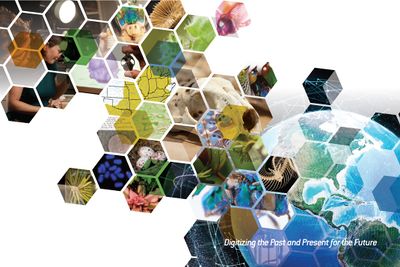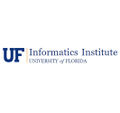| Time
|
Harn Galleria
|
Harn Chandler Auditorium
|
Harn Classroom 1
|
Harn Classroom 2
|
Powell Classroom
|
McGuire Classroom
|
McGuire Director's Conference Room
|
| 7:00-8:45
|
Breakfast on your own
|
| 8:15-8:45
|
Arrival, networking, coffee, light refreshments
|
|
Not available
|
Not available
|
|
|
Biotic Associations: Informal Open Session I
Session Notes
The primary purpose of the meeting is to discuss how existing species interaction datasets are structured and how to increase our ability to generate aggregate datasets and examine networks of interactions. The ADBC program has promoted the mobilization of tens of millions of specimen-level data in natural history collections in the United States and many of these datasets contain rich species interaction data. During the first meeting Jorrit Poelen (Global Biotic Interactions, GloBI) and Katja Seltmann (UC Santa Barbara, Parasite Tracker) will present a recent Vampire Moth (Calyptra) interaction data use case, setting the stage for open discussion that will likely carry through the second meeting. We encourage participants to submit interaction datasets before the meeting so that they can be discussed as use cases. You can describe, point to, or share, your datasets by opening a new issue via https://tinyurl.com/shareInteractionData . You can also see how GitHub issues are used to openly discuss how to share specific existing biotic association datasets.
|
| 8:45-10:20
|
|
Plenary Session VI
|
Not available
|
Not available
|
|
|
|
| 10:20-10:45
|
Morning Break (provided)
|
|
Not available
|
Not available
|
|
|
Biotic Associations: Informal Open Session II
Session Notes
The primary purpose of the meeting is to discuss how existing species interaction datasets are structured and how to increase our ability to generate aggregate datasets and examine networks of interactions.
|
| 10:45-12:00
|
|
Concurrent Session I
|
Demos & Innovations I Matt Collins
Session Notes
|
Symbiota2 Overview Neil Cobb
Session Notes
This first session will cover upcoming software developments and outreach plans for the Symbiota NSF-ABI project.
| Agenda
|
| Symbiota - Part 1
|
Curtis Dyreson
|
Virtual
|
| Symbiota - Part 2
|
Ben Brandt
|
Virtual
|
| Phylogeny and Phenology Plugin
|
Will Pearse
|
Virtual
|
| Mobilizing data in developing countries: Pakistan & Somaliland
|
Mary Barkworth
|
Virtual
|
| Technical Support and Outreach
|
Neil Cobb & Lindsie McCabe
|
In-person
|
| Fieldguide
|
Andre Poremski
|
Virtual
|
|
Specify Collections Consortium I Jim Beach & Norine Spears
Session Notes
Speakers: Jim Beach, Norine Spears, Founding Members
Mode: Presentations, Q&A with Local and Remote Participants, Live Streaming
| Agenda
|
| The Successful Creation of Specify Collections Consortium (SCC)
|
| SCC Vision: Mobilizing Collections Data with Collaborative, Open Source Software
|
| SCC as a Sustainable Non-Profit for the Long Run – Organizational Model
|
| Founding Member Perspectives--in Their Own Words
|
| Board of Directors – Members and Roles
|
| Research and Technical Committees, Members and Roles
|
| Key Roles of Technical Liaisons
|
| SCC Current Technical Collaborations, U.S. and International
|
| International Engagement and Recognition
|
| Q&A
|
|
Communicating Biodiversity Science in Popular and Social Media Natasza Fontaine & Austin Mast
Session Notes
Panelists (David Blackburn, Robert Gropp, Barbara Thiers, Erin Tripp, Natalie van Hoose, and Matt von Konrat) will address questions regarding (1) personal goals for communicating biodiversity science in popular and/or social media, (2) metrics with which to measure successful attainment of those goals, (3) community prioritization of this form of science communication, (4) factors (e.g., strategies and partners) critical to success in this area, and (5) impediments to success. Other participants in the breakout will be encouraged to pose follow-up questions or share from their own experience.
|
Building Institutional Digitization Synergy Kevin Love, Deborah Paul, & Larry Page
Session Notes
Data mobilization doesn’t (have to) stop when digitization is complete or grant funds have been exhausted. In this discussion group, we will explore how efforts, like a local digitization committee or leveraging institutional resources and policy, can inspire data mobilization across your collaborators' institutions.
|
|
| 12:00-1:00
|
|
|
Lunch (provided)
|
|
|
|
| 1:00-2:15
|
|
Concurrent Session II
|
Demos & Innovations II Matt Collins
Session Notes
| Agenda
|
| ADBC Education Resources / WeDigBio
|
Molly Phillips / Austin Mast
|
| BiotaPhy web platform
|
Ryan Folk
|
| Analytical tools
|
Anthony Melton & Shelly Gaynor
|
|
Symbiota Portals & Software Tools Neil Cobb
Session Notes
This second session will feature presentations on new efforts to expand TCN portals and the creation of synthetic Symbiota portals. It will also include new developments for projects that integrate with Symbiota (e.g., GeoLocate).
| Agenda
|
| Biotic Associations: GLoBI
|
Jorrit Poelen
|
In-person
|
| PhyloLink
|
Joe Miller
|
In-person
|
| Geolocate
|
Nelson Rios
|
In-person
|
| GenBank linkage
|
Andrew Miller
|
In-person
|
| Creating a multi-phyla Symbiota portal for U of Wisconsin collections
|
Laura Prado
|
In-person
|
| Developing a Global Mycology Portal
|
Scott Bates
|
In-person
|
|
Specify Collections Consortium II Jim Beach & Norine Spears
Session Notes
Speakers: Jim Beach, Norine Spears, Local and Remote Speakers, Live Streaming
Mode: Short Presentations, Partner Vignettes, Interactive Discussion
| Agenda
|
| SCC Technology and Services, Near Term Road Map
|
| Specify's Evolving Capabilities, Supporting Collaborative Computing
|
| Future User Requirements--Discussion and Feedback
|
| Wrap Up and Next Steps for the Consortium
|
|
Broadening Participation Kari Jordan
Session Notes
What must be done to make you feel that your work is engaging, and you're part of a community? If you are looking for concrete, evidence-based approaches to community building and broadening participation, this session is for you. We will cover simple strategies to gather baseline metrics and assess outreach and engagement, all for the purposes of recruiting, retaining, and broadening participation of communities underserved in Biology, Museum Collection, Geology, IT, Bioinformatics, and other STEM disciplines. You don’t want to miss it!
|
Innovation & Unconference Deborah Paul
Session Notes
Bring your inspirations from recent experiences, conversations. and presentations at ADBC Summit 8 to this breakout. We will gather ideas and find others with innovative ideas and expertise to share. An unconference gives you the chance to design your own breakout and bring timely topics that are on your mind - to a larger group.
|
|
| 2:15-2:45
|
Afternoon Break (provided)
|
|
|
|
Afternoon Break (provided)
|
|
|
| 2:45-4:00
|
|
Concurrent Session III
|
Communicating with Administrators Gil Nelson & David Jennings
Session Notes
Keeping administrators abreast of your collection’s activities and its importance to your institution’s mission is critical to ensuring long-term support and positive internal relations. Knowing which metrics count and how best to express them as well as how to open and maintain avenues for positive communications with the administrative team is essential. This session will begin with brief opening remarks before transitioning into open discussion and sharing of successful techniques and strategies. We are pleased that Barbara Thiers and Bruce MacFadden, both with deep experience working with administrators at several levels, have agreed to join us as co-moderators.
An Introduction to Communicating with Administrators by David Jennings
|
Georeferencing tools and practical considerations from two TCN projects Andrew Miller & Michael Denslow
Session Notes
We will discuss various aspects of georeferencing as it relates to TCNs. Topics will include facilitating collaborative georeferencing, error rates and tools for working with georeferenced museum metadata.
| Talks (15 min each, order TBD)
|
| Brief Introduction
|
Michael and/or Andy
|
In-person
|
| Error rates in batch georeferencing: an example from Illinois
|
Andrew Miller
|
In-person
|
| Building collaborative georeferencing communities: an example from University of South Carolina
|
Herrick Brown
|
In-person
|
| An example of “first pass” georeferencing from the SERNEC - TCN
|
Nelson Rios
|
In-person
|
| Tools for visualizing georeferenced museum specimen metadata
|
Michael Denslow
|
In-person
|
| Discussion
|
All
|
In-person
|
|
Data Quality Feedback Richard Garand & Deborah Paul
Session Notes
Quality data is essential as a foundation for analytical, synthetic, and AI research. Anyone providing data to an aggregator or downloading data from an aggregator can make use of the data quality feedback offered. If you use this information, we would like to hear about how you use it (or not) and ways in which all of us can work on improving data quality (dq). From researcher, policy maker, graduate student, collection manager, curator, educator, and museum director, we all have a role to play. We also plan to share some of what we learned from a recent survey and symposium at SPNHC-TDWGNZ -- on this topic. And, we'll share some ideas for possible future changes to dq feedback from iDigBio as well as recent progress from the TDWG Data Quality Interest Group and iDigBio implementation plans.
|
Challenges in Research Use of Data Bruce Lieberman, Matt Collins & Pam Soltis
Session Notes
We now have millions of digitized specimen records available for use in research, education, and other applications. Yet researchers face many challenges as they attempt to use these data. In this session, we will discuss ongoing challenges of data completeness, data quality, and fitness for use and possible solutions. We will also explore novel data types extracted from digitized specimen records – whether text or images – and consider community needs for effective use of these data in research.
|
|
|
| 4:00-4:10
|
TRANSITION TO AUDITORIUM FOR WRAP-UP
|
| 4:10-4:30
|
|
Summit Wrap-Up David Jennings
|
|
|
|
|
|
| 4:30
|
Adjourn
|





